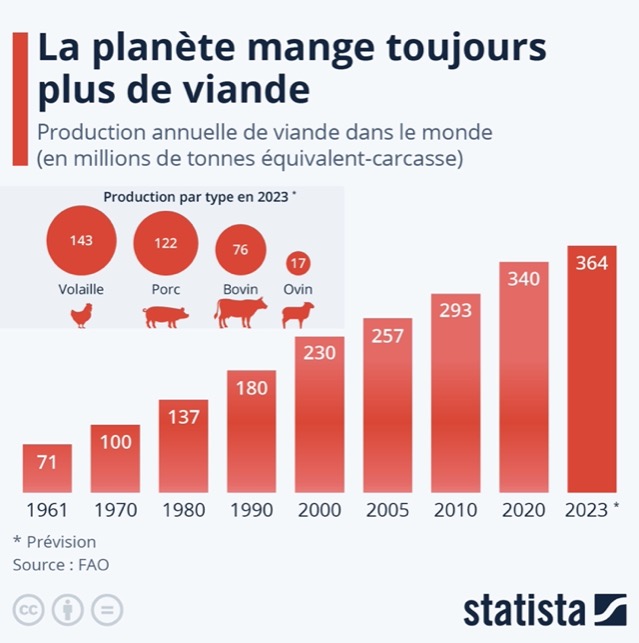The Harms of meat consumption: A reflection on our diet
Meat consumption, rooted in the culinary traditions of many cultures, has been at the heart of a growing debate in recent decades. While meat has long been associated with nutritional richness and prosperity, its effects on health, the environment and animal welfare are now raising major concerns. This article explores the negative impacts of meat consumption, in order to encourage reflection on our eating habits.
1. Health Impact
Excessive consumption of meat, particularly red and processed meat, is linked to a variety of health problems, including:
Cardiovascular disease: Red meat is often high in saturated fat, which can raise cholesterol levels and increase the risk of heart disease.
Cancer: The World Health Organization (WHO) has classified processed meat as carcinogenic to humans and red meat as probably carcinogenic. Regular consumption may be associated with an increased risk of cancers, including colon cancer.

Obesity and Diabetes: A diet high in meat can lead to overconsumption of calories, increasing the risk of developing obesity and type 2 diabetes.
2. Environmental Devastation
The meat industry is one of the most polluting industries in the world. Its environmental impacts include:
Greenhouse Gas Emissions: Livestock farming contributes significantly to global warming, producing massive amounts of methane, a particularly potent greenhouse gas.
Deforestation: Millions of hectares of forest, particularly in the Amazon, are destroyed each year to make way for pasture or to grow grain for livestock.
Water Consumption: Meat production requires much more water than plant crops. For example, producing 1 kg of beef can require up to 15,000 litres of water.

3. Animal Suffering and Welfare
Intensive animal farming, which dominates the meat industry, raises important ethical questions. Animals are often confined in small spaces, deprived of natural living conditions and subjected to painful practices. In addition, their slaughter, although regulated, remains a source of stress and suffering.
4. Sustainable and Healthy Alternatives
Faced with these challenges, many solutions are emerging to reduce our meat consumption:
Vegetarian or vegan diet: These diets exclude or limit meat, promoting an increased consumption of fruits, vegetables, legumes and cereals.
Alternative proteins: Plant-based products, such as plant-based burgers or proteins from legumes, are gaining popularity.
Food education: Raising awareness of the impacts of meat consumption is essential to encourage more responsible choices.

Reducing meat consumption is not only a matter of individual health, but an imperative for the planet and animal welfare. Adopting more sustainable and ethical eating habits is both a personal and collective approach, necessary to preserve our common future. By diversifying our diet and promoting plant-based alternatives, we can work towards a healthier and more balanced world.


